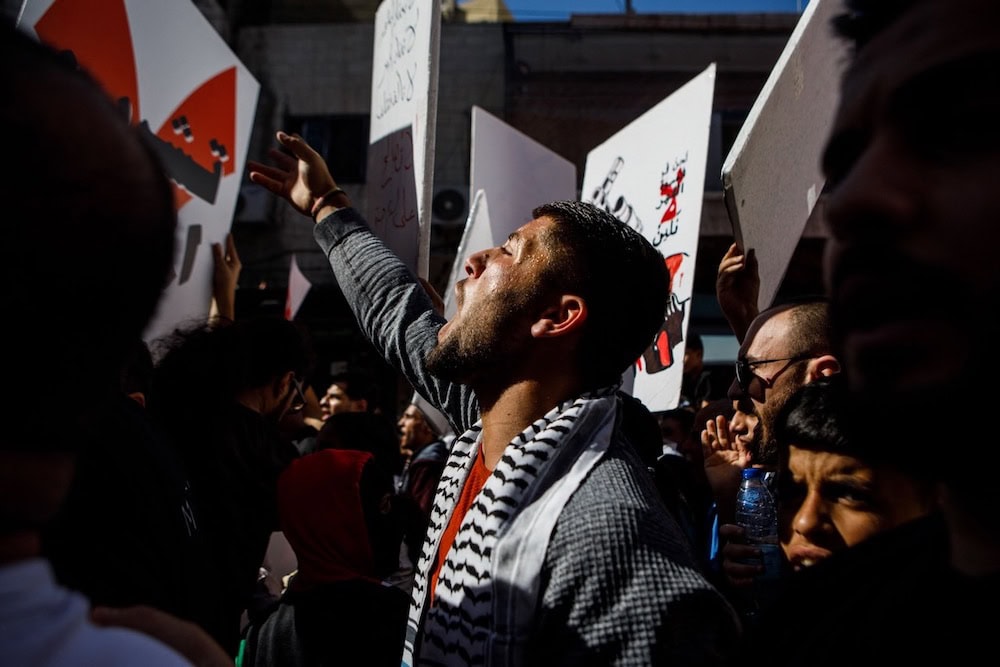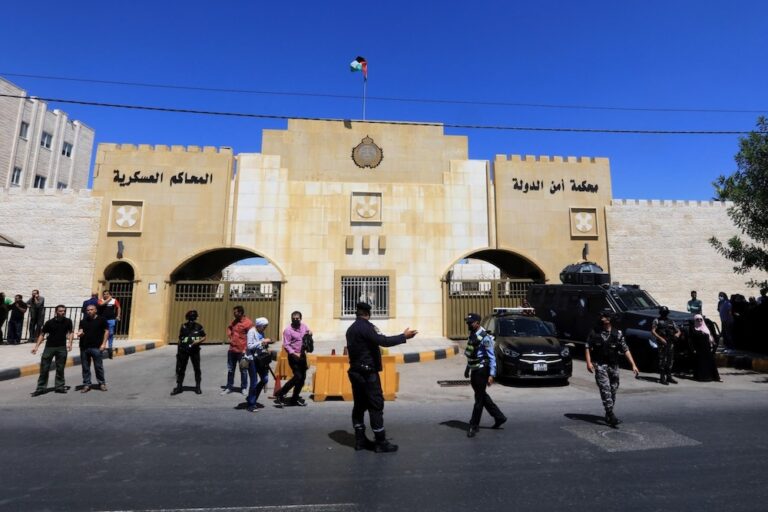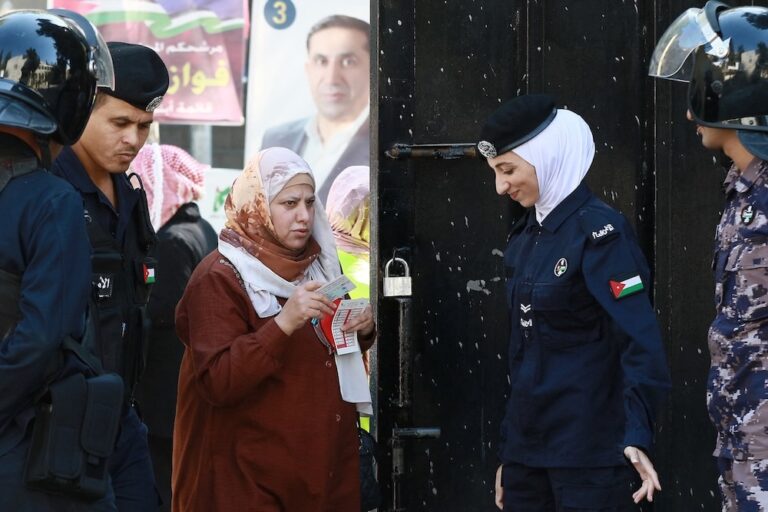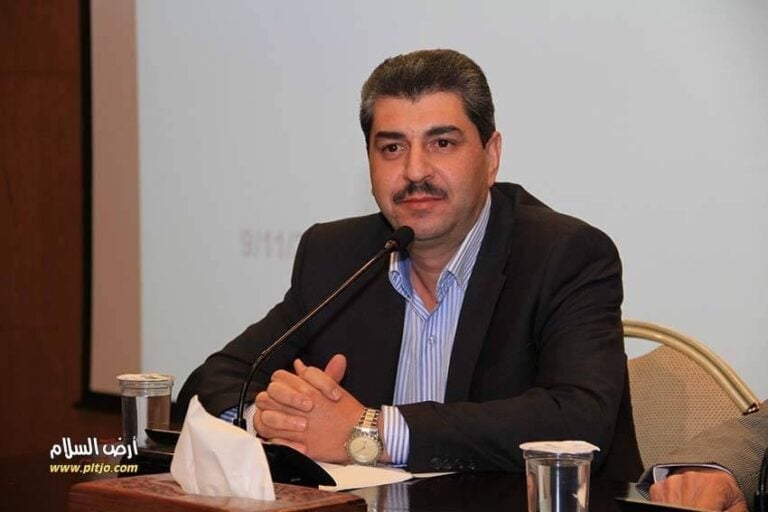Authorities have used the Cybercrime Law to suppress citizens' freedom of expression, launching an arrest campaign targeting activists.
This statement was originally published on smex.org on 25 June 2024.
Renewed and widespread controversy has erupted in Jordan over how to balance protecting people’s security with guaranteeing their right to free expression.
This has become especially relevant after the Israeli aggression on the Gaza Strip since October 2023 and the protests that erupted in Jordan in response. Jordanian authorities have used the Cybercrime Law to suppress citizens’ freedom of expression and launched a large-scale arrest campaign targeting political activists.
In November, Jordanian Prime Minister Bisher Khasawneh asserted that none of the people who exercised their right to peaceful expression in solidarity with Gaza had been arrested or detained.
Two months later, the Euro-Med Human Rights Monitor, an independent organization headquartered in Geneva, published a report detailing the systematic arrest of political activists.
They were arrested for their public statements and social media campaigns in solidarity with Palestinians under the Cybercrime Law of August 2023.
Unlawful Detentions
Jordanian political activist Khaled Al-Natour was arrested on February 8 after a tweet criticizing Jordanian officials’ proposal to secure an export bridge by land to transport fruit and vegetables to the Israeli occupation.
“The Preventive Security Department contacted my brother to arrange a meeting with me,” Al-Natour told SMEX. “At the time, I did not understand the nature or cause of the meeting, but they informed me that it was related to my car.”
“To my surprise, I was arrested upon arrival and was told I was wanted for a cybercrime case.”
“I am certain that what I wrote does not constitute a crime and falls under my freedom of opinion as guaranteed by the Constitution,” he added.
“The Security Department reasoned that my post was ‘inappropriate,’ although they charged me with using and managing online platforms to cause strife, undermine social peace, and publish false news, violating Articles 15 and 17 of the law.”
According to Article 15 of the Cybercrime Law, “Anyone who intentionally sends, resends, or publishes data or information containing false news undermining national security and social peace via the Internet, IT networks, information systems, websites, or social media platforms shall be punished […].”
Article 17 stipulates that: “Anyone who intentionally uses the Internet, IT networks, information systems, websites, or social media platforms to publish content that causes strife, undermines social peace, incites or justifies violence or hatred, or disrespects religions shall be punished […].”
In other words, the reason communicated to Al-Natour verbally differed from the charge pressed against him.
As for the final judgment issued in his case after eight days of arrest and moving between several detention centers, Al-Natour told SMEX that he was acquitted at the Amman Criminal Court.
The judge also declared him not guilty and confirmed that his writing falls under the freedom of opinion guaranteed by Article 15 of the Constitution. This is considered a historic judgment as it is the first of its kind since the Cybercrime Law was issued.
This makes Al-Natour the first Jordanian citizen to be acquitted in a freedom of opinion case, according to attorney Bahaa Al-Atleh, a member of the Freedoms Committee at the Jordanian Bar Association.
Al-Natour’s case did not end with his acquittal. The Attorney General appealed to the judgement, and Al-Natour was arrested a second time and sentenced to a fine of JOD 5,000 (approximately USD 7,000), Al-Atleh told SMEX.
Article 15 of the Jordanian Constitution stipulates that: “The State shall guarantee freedom of opinion; and every Jordanian shall freely express his/her opinion by speech, writing, photography and the other means of expression, provided that he/she does not go beyond the limits of the law.”
Another detainee, Mahmoud (a pseudonym), faces the same fate as Al-Natour. His trial is still ongoing with charges of causing strife uncer Articles 15 and 16 of the Cybercrime Law.
“The posts I am being tried for were published by several accounts, not all of which are mine,” Mahmoud told SMEX. “There is no clear violation, as my posts were only general political criticism and did not name any specific person or country. One of my tweets had only verses from a poem.”
“This is an attempt to intimidate me and prevent me from writing about certain political issues. By referring me to the judiciary without sufficient evidence, I was indirectly asked to stop supporting the resistance and criticizing certain government measures, such as the land bridge,” he added.
Illegal Arrest Tactics
Mahmoud was arrested illegally and without a warrant and is now being tried for posting tweets critical of Jordan’s policy regarding the aggression on Gaza.
One of his family members was detained to force Mahmoud to turn himself in. Mahmoud also told SMEX that some prisoners of conscience have been detained in Jordanian prisons for more than 80 days.
Al-Atleh explained to SMEX that the arrest of family members of a prisoner of conscience by the Public Security Directorate is illegal and reveals the latter’s intention of exerting pressure on activists.
This detention mechanism violates Articles 108 and 113 of the Criminal Procedures Law, which prohibits arrest for several hours without legal justification, according to Al-Atleh.
The defendant must also be detained or imprisoned in a place designated for detention or imprisonment. Neither of these conditions was met in any of the cases.
Al-Atleh added that the illegal arrest contradicts the special rules stipulated in Article 114 of the same Code, as the arrest should only target defendants accused of a crime and their accomplices for the purposes of interrogation.
Al-Atleh also told SMEX that the relatives of the detainees were not interrogated or listed as defendants, which proves that the purpose of their arrest at security offices was solely to pressure the targets.
This practice also violates the Jordanian Penal Code, specifically Article 346 related to the “deprivation of liberty,” which stipulates that: “Whoever unlawfully detains and deprives a person of his liberty, he/she shall be punished by imprisonment for a period not to exceed one year or by a fine not to exceed fifty dinars; if the perpetrator does so by falsely claiming that he/she is a public official and has a legal detention warrant, then the punishment shall be from six months to two years […].”
Heavy Mental and Social Toll
Prisoners of conscience in Jordan not only have to pay fines and are deprived of their liberty for days or even months, but their detention also has a psychological and social dimension.
Regarding the severity of this impact, Mahmoud stated that his trial and detention affected him directly and forced him to practice self-censorship.
His writings are now “toned down,” even if they do not violate the law, and he carefully chooses his words for fear of enraging a police officer or an official.
“I am concerned that the law in Jordan is being used to suppress any free political movement, as the authorities are trying to deter activists by targeting and arresting them.”
Mahmoud explained to SMEX that every time a political activist is punished according to this law, a swarm of social bots try to defame them and falsely associate them with certain political views on social media.
Cybercrime Law Lacks Clear Criteria
Given the lack of clear criteria in the Cybercrime Law to differentiate between freedom of expression and “cybercrime,” according to Al-Atleh, final judgements and decisions are issued at the discretion of the Cybercrime Unit based on the opinions of the investigating judge or Attorney General.
The law’s provisions are being exploited to suppress freedom of expression, Al-Atleh told SMEX. The focus during trials is on Articles 15 and 17, which he described as being “ambiguous and can be applied to any context to criminalize certain statements at the judge’s discretion.”
Al-Atleh also said that the detainees were forced to sign undertakings before the Administrative Governor, vowing not to participate in any future protests, and pay bail estimated at JOD 50,000 (USD 70,552 approx.).
Leen Al-Khayyat, an attorney and human rights expert, agreed with Al-Atleh and confirmed to SMEX that the Cybercrime Law has many gaps in its legislation, which makes it an instrument to suppress freedom of expression.
This is due to the law’s vague provisions, which criminalize people’s opinions and punish them disproportionately, according to Al-Khayyat.
In 2008, the Public Security Directorate established the Cybercrime Division within the Criminal Investigation Department.
In 2015, it rebranded the Division as the “Cybercrime Unit.” That same year, the Cybercrime Law was issued and then amended last year.
Less than a year after adopting the Cybercrime Law, its disastrous repercussions have become clear across the country.
This became evident with frequent and illegal arrests of journalists and activists, who are accused of “crimes,” not to mention the arrest of their relatives as a means of pressure.
In the long term, this practice may force Jordanians to self-censor, undermining their freedoms and harming the country’s progress at all levels.
Human rights organizations, like Amnesty International, have called on Jordanian authorities to end the crackdown that began in October 2023.
“At least 1,000 people – protesters and bystanders – were arrested during protests in support of Gaza in the Jordanian capital Amman within a one-month period between October and November 2023,” according to Amnesty.
“At least five others were arrested between November and December 2023 and charged under the Cybercrime Law for social media posts expressing pro-Palestinian sentiments, criticizing the authorities’ peace or economic deals with Israel, or calling for public strikes and protests.”
The Jordanian Bar Association does not have any accurate statistics on the number of detainees under the Cybercrime Law following the Israeli aggression on Gaza.



